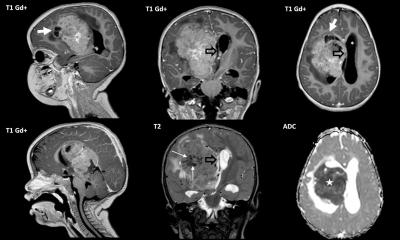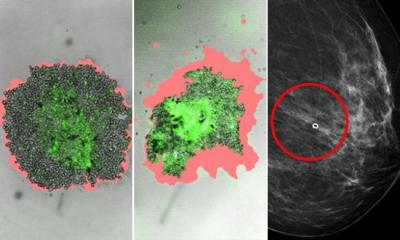Image source: Adobe Stock/Guitafotostudio
Article • Patient care
Molecular Tumour Board for better decision-making
As more genomic alterations become targets for therapy, health institutions and hospitals are creating specialist Molecular Tumour Boards to support better decision-making for patient care. This evolving team, and its role, was highlighted in a presentation at the 34th European Congress of Pathology in Basel, Switzerland.
Report: Mark Nicholls
Professor Fernando Schmitt, Head of the Molecular Pathology Unit (IPATMUP) in Porto, Portugal, told delegates that over the last decade several new substances have been launched to treat solid tumours, with some receiving approval for multiple indications. With the advance in tumour molecular biology strictly associated with the need to include more molecular analysis in tumour diagnosis, that has seen the concept of the Molecular Tumour Board (MTB) – first developed in Michigan in 2011 – play an increasingly pivotal role in the field, with pathologists as the pillars of these boards alongside clinicians. With 40% of the oncology pipeline in Phase I trials, he forecasts major expansion of molecular targets over the next three to five years.
The importance of sample management

Image source: Faculdade de Medicina da Universidade do Porto (FMUP)
Selection of an adequate sample for molecular analysis and understanding the performance of the genomic tests is paramount, enabling integrations of morphology with molecular information, said Schmitt. He further underlined the importance of pathologists’ expertise in the acqusition and management of high-quality tumour samples. ‘This is important because tumour sampling represents a crucial phase for any subsequent molecular analysis,’ he explained. Selection of the best samples has challenges and can be problematic where there are central laboratories, but he stressed the need to obtain good quality, and recent, samples and enable triage before sending them for more molecular analysis.
With samples of sufficient quality, he said NGS (next-generation sequencing) can be utilised to deliver precision medicine in oncology. While “uniplex” or “multiplex” analysis has a valid role, he indicated that NGS has advantages for analysis of a large number of genes, has good sensitivity, and is a modern tool that works well in pathology. Within the MTB arena, specific scales have been designed and approved for assessing samples for clinical actionability. And while a good quality sample ensures the material is suitable for molecular analysis, it may also deter oncologists from migrating to liquid biopsy. ‘We know liquid biopsy is a good compliment for tissue analysis, but it is not a replacement for tissue analysis,’ said Schmitt.
Multidisciplinary council
So, in the end we will have a treatment decision, we can request alternative molecular profiling assays, we can decide for an off-label treatment, or enrol a patient in a specific clinical trial
Fernando Schmitt
The MTB expands the possibilities for genetics-guided therapy, but he emphasised the need to bring the required expertise together in the MTB ‘to ensure optimal care in an increasingly complex biomarker landscape.’ The aim of MTBs is to define the most appropriate strategies for genomic profiling and the correct interpretation of the results obtained from the molecular analyses of tumours. MTBs can include specialists ranging from pathologists, radiologists, molecular geneticists to pharmacologists and clinicians. Reports should contain patient identification, and results that are concise and clear.
The MTB allows integration of modern molecular diagnostic data and discussion of complex cases; it offers more precise and rational therapy recommendations; identifies and optimizes patients access to clinical trials; guides patient testing and treatment allocation practices; and promotes continuous medical education on emerging biomarkers. ‘It is a multidisciplinary decision-making platform aimed to improve patient outcomes by consensus and standardized procedures,’ Schmitt added. ‘So, in the end we will have a treatment decision, we can request alternative molecular profiling assays, we can decide for an off-label treatment, or enrol a patient in a specific clinical trial.’
While he emphasized that all tumours should be discussed, MTBs are particularly valuable for rare mutations, rare tumours without available therapeutic options, gene alterations that are not reported as associated with drug response or resistant, patients with oncogene-addicted tumour, or tumours that do not show responsiveness to the available targeted therapies.
Molecular guided therapy typically takes up around 6% of patient treatment costs, compared to hospitalization (34%) and drugs (60%). Schmitt also outlined the example of the POP-IPOP trial in Porto, looking at the challenges of broad molecular profiling such as timely access to results, access to the right drug at the right time, multiple potential actionable alterations in the same patient and of how to navigate the available evidence.
Profile:
Fernando Schmitt is Professor of Pathology at the Medical Faculty of Porto University; he heads the Molecular Pathology Unit at IPATIMUP (Institute of Molecular Pathology and Immunology of the University of Porto), a Portuguese non-profit institution dedicated to health sciences research. Furthermore, he is Director of RISE Health Research Network; and general secretary and president-elect of the International Academy of Cytology.
20.10.2022





